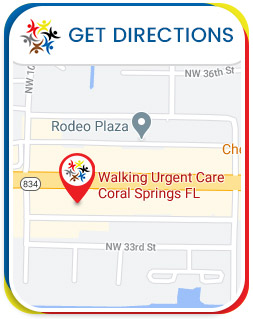What to Consider When Choosing a Primary Care Physician?
Primary care physicians are responsible for a wide range of tasks, including routine checks as well as diagnosing and treating illnesses, injuries, and other health concerns. We provide a wide range of services such as minor injuries treatment, asthma treatment, COVID-19 testing, x-rays, lab testing, and much more. If you are in search of a primary care clinic near you, visit Walking Urgent Care. Our doctor, Dr. Naseh Nawabi, and professional medical staff will be ready to facilitate you according to your health needs. For more information, Contact us or walk in, we are conveniently located at 10308 W Sample Road Coral Springs, FL 33065.


Table of Contents:
What is the difference between a family doctor and a primary care physician?
What type of doctor is best for primary care?
What should you keep in mind when selecting a primary care physician?
What primary care services should you look for?
Everyone needs a medical “home base” – where you are known, with a doctor you can trust, and who is invested in you and your health. We are at our most vulnerable when either ill or seeking confidential or personal advice, so it is important that we feel safe and secure. Having a medical professional “on the side” who knows you and your medical history, health concerns, and wellness goals is invaluable. In addition, on a more practical note, some insurance companies won’t cover specialist visits without a referral from a primary care provider, such as a family doctor.
Sometimes the plethora of medical titles and names can be confusing and tricky to understand. Although they cover a lot of the same ground, there are some subtle differences between a family doctor and a primary care physician:
A family doctor is a primary care provider who often cares for different members of the same family, from infants to seniors, at various stages of their lives. They are often the doctor you will see to treat minor problems such as bronchitis, and major problems, like high blood pressure; for those situations outside of their remit, a family doctor will refer you to a specialist for further evaluation. One of the benefits of having the same doctor treat different members of the same family is knowing potential genetic issues like heart disease, obesity, and high cholesterol that they can use to try and head off in the younger members.
Primary care physicians will likely be the first medical professionals you’ll see, whether you’ve got the flu or are battling depression. They treat a wide range of health issues for people of all ages and can help coordinate medical treatment with various specialists if they come across something that is outside of their scope of practice. They are also trained in disease prevention and management.
A primary care physician can be any of the following:
– Family medicine practitioner
– Nurse practitioner
– Physician assistant
– Internist
– Pediatrician
– Geriatrician
The best doctor for primary care will be the one who is best equipped to deal with your issue(s). For example, pediatricians and geriatricians both provide primary care but treat very different demographics. In the vast majority of cases, the primary care doctor of choice will be the family doctor, as they are the ones who know their patients best, and who their patients are comfortable seeing.
When choosing a new primary care doctor many people will probably do an internet search to see what’s in their local area. This will give you many physicians in your area, but how do you narrow it down? The best way to decide is to have an in-person visit with the doctor. Make a “meet and greet” appointment and jot down any questions you may wish to ask such as:
– Are they taking new patients?
– Are they a preferred provider under my insurance plan?
– Do they accept Medicare?
– What are the doctor’s qualifications/specialties?
– What days/hours does the doctor see patients?
– Does the doctor take phone calls?
– Does the doctor accept emailed questions? If so, is there a charge?
– Does the doctor ever make house calls?
– Does the doctor do video calls?
– How far in advance would I have to make appointments?
– What’s the process for urgent care? How would I reach the doctor in an emergency?
– What happens after hours or when the doctor is away?
At Walking Urgent Care, we offer a variety of different services for patients of all ages.
Our primary care services include:
– Physicals
– Sick visits
– Prescription management
– Sports medicine and athletic physicals
– Chronic disease and disability management
– Immunizations and vaccines
– Dietary planning and weight loss services
Consider the location of the doctor’s office – will it be easy to get to when you’re sick? Is it served by public transport? What’s the parking like? Is it wheelchair/walker accessible? Finally, see if local family or trusted friends can give you a recommendation. Personal endorsements can mean a lot. For more information, Contact us or walk in, we are conveniently located at 10308 W Sample Road Coral Springs, FL 33065. We serve patients from Coral Springs FL, Margate FL, North Lauderdale FL, Coconut Creek FL, Parkland FL, Boca Raton FL, and all of Florida.










